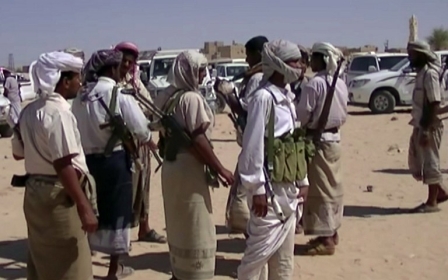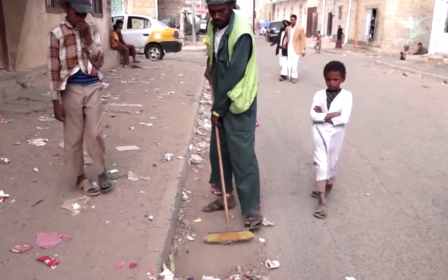Yemen's Houthis protest against government

Tens of thousands of Houthis joined an anti-government rally in Sanaa on Monday in response to a call by Shiite rebel commander Abdulmalik al-Houthi.
The protesters assembled in Change Square and then paraded through the centre of the capital, where supporters of the rebels, who are known as Houthis or Ansarullah, had converged during the morning after travelling from outside the capital.
A tight security cordon was in place around Sanaa, with increased security along the main roads, though no incidents had been reported by the middle of the day.
There was also a concentrated presence by air force planes circling the skies above the march, reports Yemeni news site Yemen Now.
The demonstrators chanted slogans against the government, which has struggled to manage the political transition since the ouster in 2012 of veteran president Ali Abdullah Saleh.
Participants chanted slogans demanding that current President Hadi “change course” and said he had “sold [Yemen] out to the Islamic State.”
They were also protesting against the government’s July decision to end a petrol subsidy.
The spokesperson for Yemen in Washington, Mohammed al-Basha, claimed that the march had not garnered support from any other political groups, and that numbers had fallen short of a 5 August protest.
However, a journalist who attended the protest estimated that Monday’s march attracted around twice as many participants:
In a speech on Sunday night, Abdulmalik al-Houthi had called on his followers to march on Sanaa and demand "the fall of the government, which has failed.”
After the speech, hundreds of cars belonging to Houthi supporters arrived in the capital ahead of Monday’s demonstration, according to Yemen Now.
In his speech, Abdulmalik al-Houth gave the government a deadline of Friday to meet the protesters' grievances.
Otherwise, additional forms of "legitimate action" would be used, Houthi warned.
In the coming days, "we will erect tents, carry out sit-ins and organise marches" in Sanaa, the rebel leader said, threatening to respond to any provocation.
"We won't stand with folded arms in the face of crime," he said.
Up to 1,000 Houthis have remained in the capital, and despite heavy rainfall some have set up tents in the central Change Square, the epicentre of 2011’s uprising against former President Ali Abdullah Saleh.
Houthis, who have been battling the central government for years, repeatedly complained of marginalisation under Saleh, who ruled for 33 years.
Activists had demonstrated in early August against the near-doubling of petrol prices, as well as seeking the government's overthrow.
Houthis control Saada province in northern Yemen and is suspected of wanting to broaden its sphere of influence in a future federal state, which would comprise six provinces and in which Houthis fear the inequality between rich and poor areas would be exacerbated.
Houthi forces reached just outside Sanaa in July when they took the city of Amran, but they later agreed to withdraw.
New MEE newsletter: Jerusalem Dispatch
Sign up to get the latest insights and analysis on Israel-Palestine, alongside Turkey Unpacked and other MEE newsletters
Middle East Eye delivers independent and unrivalled coverage and analysis of the Middle East, North Africa and beyond. To learn more about republishing this content and the associated fees, please fill out this form. More about MEE can be found here.




